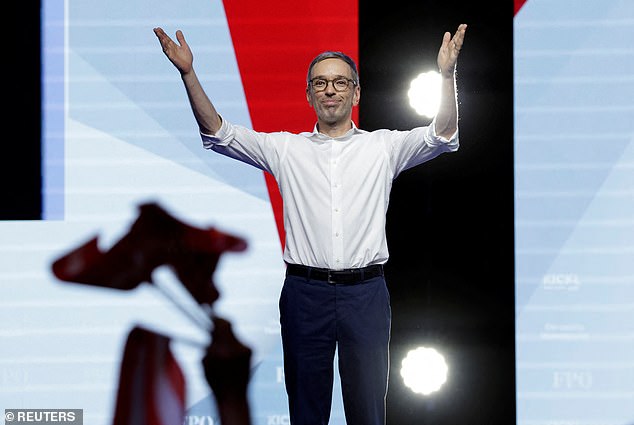Austria’s far-right Freedom Party (FPOE) is on the cusp of winning this week’s election, with its firebrand leader courting votes by promising to close borders and end support for Ukraine.
Herbert Kickl, 55, has vowed to transform the country into “Fortress Austria” and criticised the current government’s “failed migration policy” as being to blame for the Islamist terror plot against a Taylor Swift concert.
He and his party have promoted ‘remigration’, the controversial concept that promotes the expulsion of immigrants of non-European ethnic origin who are deemed to have failed to integrate.
Critics also see him as lenient towards Vladimir Putin and he has repeatedly called for an end to Austrian support for Ukraine, arguing that the country should remain neutral.
A fan of Viktor Orban, Hungary’s pro-Putin president has accused the EU of being “warmongering” and said he would veto sanctions against Russia if he became chancellor.
A victory for the FPOE in Sunday’s election would mark the first time a far-right party has won a parliamentary vote in Austria since the fall of the Third Reich.
Freedom Party leader Herbert Kickl has vowed to transform the country into an “Austrian fortress”
The FPOe was founded in 1956 as an alternative to Austria’s two main parties, and its first two leaders were former Nazis and high-ranking SS officers.
It later became an established part of Austria’s political landscape and when it was taken over by populist Jorg Haider it began to attract voters with its anti-immigration message.
Under Kickl’s leadership, the FPOe has rapidly gained support and is now likely to come to power as senior partner in a new coalition with the conservative Austrian People’s Party (OVP).
Since he took over the party in 2021, it has risen in the polls to about 27 percent, up from 18 percent three years ago.
The populist leader had previously been a behind-the-scenes operator within the party, helping to reshape it in the 1990s and lead it to government in Vienna in 2000.
Fuelled by discontent over rising inflation, Kickl has benefited from the falling popularity of the ruling coalition of conservatives and greens.
In the European elections in June, the FPOe topped the poll at national level for the first time, obtaining more than a quarter of the votes.
Kickl is a professional politician who studied philosophy, history, communication and political science before joining the FPOe in 1995.

The FPOe could come to power as a senior partner in a new coalition with the conservative Austrian People’s Party (OVP). Pictured: the leader of the Austrian People’s Party (OEVP) and Austrian Chancellor Karl Nehammer

Since Kickl (centre) took over the party in 2021, it has risen in the polls to around 27 percent.
But little is known about his private life and he has kept a low profile, with voters drawn to his orderly and reliable demeanor in contrast to his flamboyant predecessors.
But his unassuming and nondescript image contrasts with his virulent rhetoric, which he employs with skill against his political opponents, calling President Alexander Van der Bellen a “senile mummy.”
“He is the rudest politician in the country,” said journalist Nina Horaczek, who analysed Kickl’s speeches in a book published this year.
“It’s a way of discrediting those who think differently,” he added.

Visitors queue to enter the Parliament building in Vienna, Austria, on September 23, 2024.
However, Kickl has also avoided debates and interviews, denouncing the media for its “lack of objectivity.”
He declined AFP’s request for an interview.
Instead, it has turned to social media. Last year, the FPOe sparked outrage with a video promoting an extremist conspiracy theory that white Europeans are being replaced by immigrants.
It also featured the Vienna balcony where Adolf Hitler gave his speech when he returned triumphantly to his homeland after the Nazis annexed Austria in 1938.
The FPOe was founded by former Nazis, and Kickl has frequently used terms reminiscent of the party’s troubled past, even calling himself the future “Volkskanzler” – the people’s chancellor, as Hitler was called in the 1930s.
“It’s a well-directed provocation with two goals: to get people talking and to send very clear signals” to the most radical sectors of the party, Horaczek said.
Kickl denies that “Volkskanzler” is a Nazi reference, insisting that several politicians have claimed the term in the past.
But the far-right leader has never hidden his closeness to extremist groups and already in 2016 he expressed his support for the Identitarian Movement.
He has also championed the far-right concept of “remigration”, which calls for expelling people of non-European ethnic backgrounds who are deemed to have failed to integrate.
In 2018, during his time as interior minister, Kickl oversaw a controversial raid on the country’s secret service, where documents on links between the FPOe and extremist circles were seized.
And in April, prosecutors launched a corruption investigation against him amid allegations that he misappropriated public money to pay for advertisements in exchange for supposedly favorable coverage.
Last year, Kickl appeared on posters in his home region of Carinthia, dressed in a green parka with military overtones alongside the slogan: “Fortress Austria: Close borders, ensure security.”
For the upcoming national elections he has put on a suit, but he has kept the slogan.

